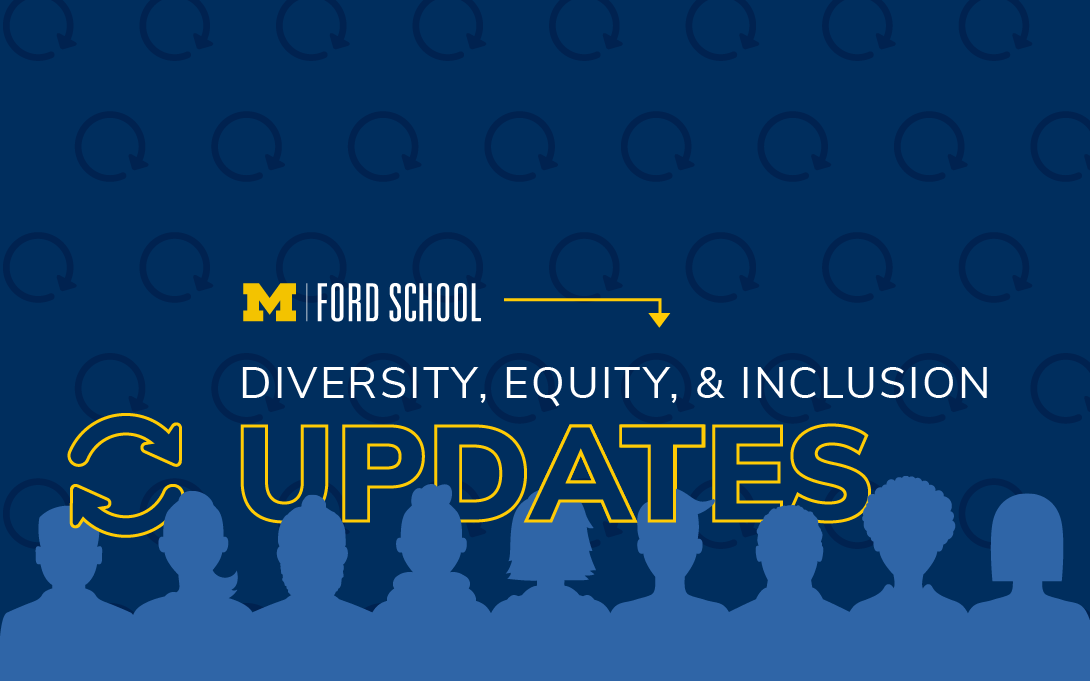
Updates regarding faculty, staff, and student DEI-related activity at the Ford School
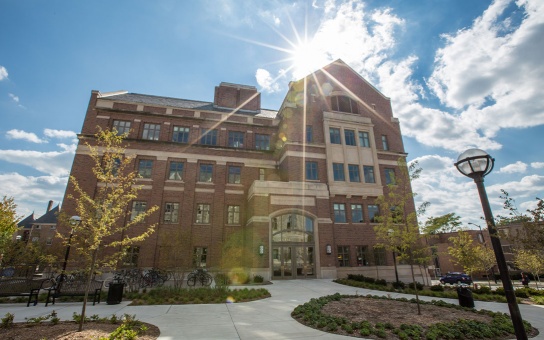
Diversifying who we are
The undergraduate organization, Students of Color in Public Policy (SCPP), hosted an undergraduate application preparation and panel discussion. SCPP strives to help prospective students—applying for admission to the Ford School's BA major beginning in fall 2022—who are traditionally underrepresented in the Ford School community navigate the application process and to provide perspective on being members of the Ford School community.
Diversifying what and how we teach
We’re very excited about this semester’s lineup in the Racial Foundations of Public Policy series, hosted by our Center for Racial Justice. Thanks to a collaboration with John Ciociari and Susan Page in the Weiser Diplomacy Center, the focus winter semester will be global. Three speakers are confirmed: Brenda Plummer on “America and the Colonial Project” (February 3); Kelebogile Zvobgo on “Race in the Development of the IR Discipline” (February 23); and Jamil Dakwar of the ACLU to speak about “Transnational Advocacy and the BLM Network” (March 17).
The Center for Racial Justice (CRJ) is pleased to announce the launch of its Racial Justice Reading Circles. Reading circles consist of three 2-hour meetings in which a small group of graduate students (MA, MPP, MPA and PhD students), postdocs, and faculty collectively explore a topic relevant to the study of race, (anti)racism, and racial justice. This semester, CRJ has two exciting opportunities: a reading circle on Racism, Health & Genetic Discrimination with Dr. Lynette Hammond Gerido, and a second reading circle on Policing with Dr. Nick Camp and Dr. Jeffrey Morenoff.
Promoting an equitable and inclusive climate
DEI funding is available to Ford School student organizations who implement initiatives that promote DEI related values. The purpose of the funding is to encourage student-led programming that advances the Ford School’s four central pillars. All DEI funding proposals should be submitted to Stephanie Sanders ([email protected]).
In December, the Ford School Health and Wellness Committee hosted, “What just happened? Reflections on a unique fall semester.” As the semester closed, this session provided staff with an opportunity to reflect and check-in with self and others on how they managed the positives and challenges during this time. Joy Pehlke, who participated in the Ford School staff retreat in 2020, facilitated the interactive discussion.
In January Students of Color in Public Policy (SCPP) hosted Morela Hernandez to guide students through a conversation and interactive exercise on leadership for women of color in public policy. The conversation focused on negotiating salary and leveraging networks for career advancement. This event is part one of a two-part series.
Interested in joining a new undergraduate student organization? Students of Color interested in Law, Government, Policy, and Social Justice (SOCiiL) is a new undergraduate organization for students interested in pursuing a career in public service. For more information about SOCiiL, please contact Ayodele Ojo at [email protected].
Diversifying our research and policy engagement
The National Center for Institutional Diversity (NCID) has named Celeste Watkins-Hayes, Jean E. Fairfax Collegiate Professor of Public Policy and Associate Dean for Academic Affairs as one of five 2022 Anti-Racism Collaborative Research and Community Impact Fellows for their established track record of research and relationships with community partners on work that challenges systemic racism. The Anti-Racism Collaborative is a partnership of NCID with the provost’s office anti-racism initiative, intended to help support connections between and elevation of scholars across our U-M campus who study racial inequality and justice.
Katherine Michelmore, associate professor of public policy, says the long-term effects of a permanent tax credit would be positive for the U.S. economy, as children who grow up in families with higher incomes “tend to do better in school, they’re more likely to graduate from high school. It might be 50 years down the road but there will be more cost savings in the future.”
Federal lawmakers continue to seek out University of Michigan faculty, including Ford School faculty members, to lend their expertise and knowledge to help inform federal policy. In 2021, 13 U-M faculty members and researchers testified at 14 congressional hearings spanning an array of policy issues.
Dual MD/MPP candidate, Yoni Siden, co-authored an article with U-M medical school colleagues about Reducing Implicit Bias in Maternity Care: A Framework for Action.
Upcoming events
Black History Month opening ceremony
February 1 | 3:00 - 5:00 pm ET
Keynote address from Naomi André
Happy Black History Month! Please join Multi-Ethnic Student Affairs (MESA) and the Black History Month Planning Committee for the Opening Ceremony as they begin a month full of programs and events, all of which will focus on the joyous experiences, successes and contributions of Afro-descended peoples from around the world. The Opening Ceremony will be live-streamed and includes an exciting program filled with spoken word performances, vocal music, and a keynote address from Naomi André. Registration is required.
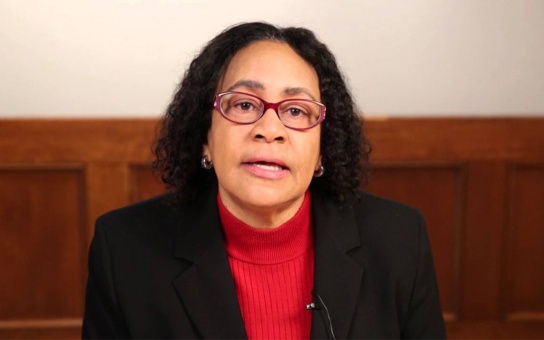
America and the colonial project
February 3 | 4:00 - 5:30 pm ET
Noted historian Brenda Gayle Plummer
Understanding how race intersects with public policy has never been more important. This requires examining the racial foundations of public policy in the United States—the focus of an inaugural series convened by the Center for Racial Justice (CRJ) this fall—and how race impacts policy choices and consequences at the global level. This winter, the CRJ is partnering with the International Policy Center and Weiser Diplomacy Center to host a series on race in international relations. For the first event in the series—a conversation with the noted historian Brenda Gayle Plummer. She will share insights in dialogue with Ford School Professor John Ciorciari on the ambivalent, inconsistent role the United States played in the colonial enterprise and its links to racial oppression within the United States. Registration is required..
Anti-racism teach-in
February 8 | 6:00 - 7:30 pm ET
Dillon Alexandro Cathro
This peer-led teach-in will engage analytical frameworks for examining systemic cultural, social, economic, and political forces in the community along with individual reflection. Facilitated by Dillon Alexandro Cathro, this teach-in seeks to raise critical consciousness, understand the opportunity for actions, and how resources can be distributed. Registration is required.
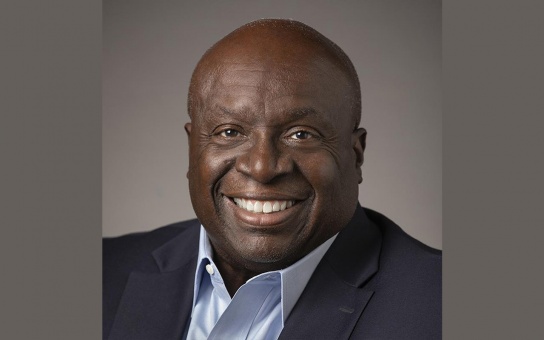
Race and foreign policy professions
February 9 | 4:00 - 5:30 pm ET
Ambassador Harry K. Thomas Jr.
This winter, the Center for Racial Justice is partnering with the International Policy Center and Weiser Diplomacy Center to host a series on race in international relations. Please join us for the second event in the series—in conversation with Ambassador Harry K. Thomas Jr. Registration is required.
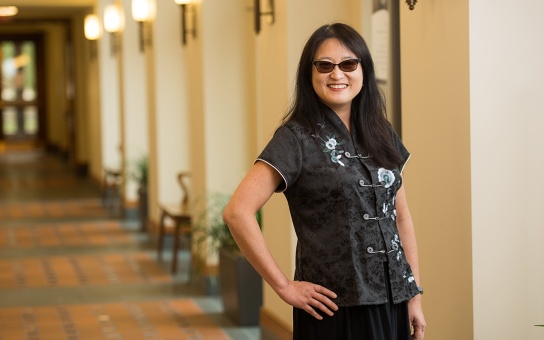
Immigration policy and racial justice
February 10 | 12:00 - 12:50 pm ET
Public Policy and Institutional Discrimination Discussion Series
The Ford School of Public Policy is proud to continue the Public Policy and Institutional Discrimination Discussion Series. The virtual series, open to students, faculty, and staff, is designed to foster dialogue on important issues of U.S. public policy. This session focuses on, "Immigration reform and racial justice” and is facilitated by Ann Chih Lin, associate professor of Public Policy. Registration is required. - Beyond Privacy: Emerging Rights Challenges in the Age of Big Data
Beyond privacy: Emerging rights challenges in the age of big data
February 10 | 4:15 - 6:00 pm ET
Donia Human Rights Center Lecture
Dr. Bama Athreya is an expert on international labor issues, gender and social inclusion, and business and human rights. She is an Economic Inequality Fellow at Open Society Foundations and an advisor to Laudes Foundation, and the host of The Gig Podcast. Registration is required.

Race, place and ability
February 17 | 3:00 - 4:00 pm ET
Feranmi Okanlami
Dr. Feranmi Okanlami, Director of Student Accessibility and Accommodation Services, will lead a discussion that centers on the intersection of race, ability, and the process of finding one’s place or sense of belonging. Through sharing his own personal experiences of living with disabilities and advocating for more robust and inclusive services for university students living with disabilities, Dr. Okanlami will push participants to think critically about what a truly inclusive and accessible university culture looks like. Those interested in attending this event can register for the in-person or virtual event.
20th Peter M. Wege Lecture: Expanding the base for climate action and social justice
February 23 | 1:00 pm ET
Ayana Elizabeth Johnson
Join the School for Environment and Sustainability for a casual and engaging conversation about climate action and social justice with Dr. Ayana Elizabeth Johnson. A marine biologist, policy expert, writer, and Brooklyn native, Johnson is the co-founder of Urban Ocean Lab, a think tank for coastal cities, as well as co-creator of the Spotify/Gimlet podcast How to Save a Planet, which focuses on climate solutions. Registration is required.
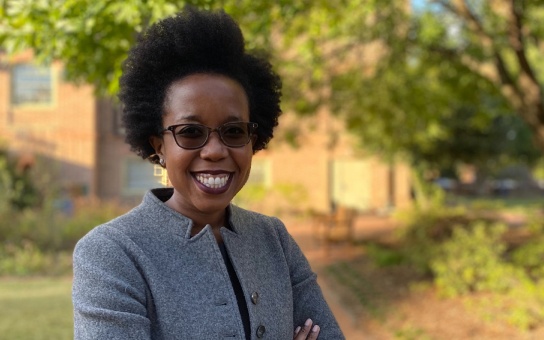
Race in the development of the international relations discipline
February 23 | 4:00 - 5:30 pm ET
Kelebogile Zvobgo
This winter, the Center for Racial Justice is partnering with the International Policy Center and Weiser Diplomacy Center to host a series on race in international relations. Please join us for the second event in the series—in conversation with Kelebogile Zvobgo. She will share insights in dialogue with Ford School Professor John Ciorciari on how racial assumptions and biases have influenced the discourse around key concepts in International Relations, such as anarchy and development. Registration required.
Learning and development
February is Black History Month. This is an annual celebration of achievements by African Americans and a time for recognizing the central role of blacks in U.S. history. The event is the brainchild of noted historian Carter G. Woodson as well as other prominent African Americans. Since 1976, every U.S. president has officially designated the month of February as Black History Month. For information on U-M Black History Month events visit https://mesa.umich.edu/black-history-month.
Resources
- Faculty and Staff Counseling and Consultation Office (including Counseling and Consultation, Educational Classes and Discussion Groups, Stress Management, U-M Emergency Hardship Program)
- First Generation Resources
- Maize and Blue Cupboard
- MHealthy/Mental and Emotional Health (including online mental health screening, insurance coverage, mental health in the workplace)
- Online Tutorial for Supervisors
- Resources for Supervisors
Financial assistance and funding opportunities
- Dean of Students Emergency Fund: undergraduate and graduate students, see website for more information.
- CEW+ Emergency Fund: graduate students and underserved undergraduate students (including but not limited to: returning students, those with children, emancipated, first-generation, transfer students).
- Ford School Emergency Fund: email [email protected] for more information.
- Rackham Student Emergency Funds: graduate students only, up to $2,500, see eligibility details on the website.